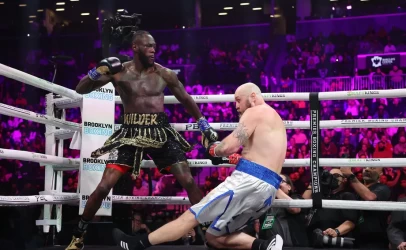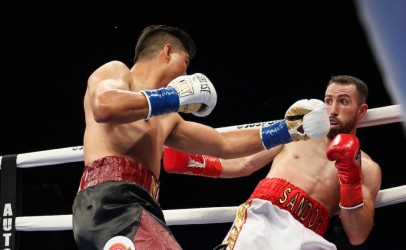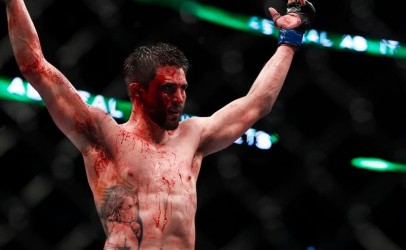At last, Deontay Wilder got what he deserved.
Sort of.
Though a devastating right hand from Tyson Fury crashed unabated into the left side of his skull, rendered him competitively limp and careening toward the ring floor at T-Mobile Arena on Saturday, his never-say-die credo was left intact.
And as he left the ring without an interview and was quickly whisked away in an ambulance to nearby University Medical Center for a precautionary post-traumatic evaluation, precisely no one among the 15,000-plus fans, foes and nonpartisan onlookers in the building had a contrarian leg to stand on when it came to critiquing his fighting spirit.
Meaning what an Olympic bronze, a professional championship and 10 successful title defenses never completely got him, a second straight concussive beatdown from Fury—this time without a humane, towel-waving surrender from the corner—was able to secure.
Undisputed heavyweight respect.
Such is the lingering residue of an instant classic.
Which Wilder’s epic trilogy closer with Fury on Saturday night—even in defeat—certainly was.
“Unequivocally,” ex-HBO blow-by-blow man Jim Lampley told Bleacher Report. “Truly great fights always elevate both fighters. Some fans will struggle to recall who actually won, believe it or not. There’s a very small universe of heavyweight title bouts like that, and they do live forever.”

Chase Stevens/Associated Press
Indeed, the dramatic give-and-take of Fury-Wilder III—which included multiple knockdowns of both fighters before the final round—elevated the totality of a rivalry that had begun in 2018 with a disputed 12-round draw and continued in 2020 with Fury’s savage seventh-round TKO win.
That fight ended when Wilder’s then-trainer, ex-Olympic and professional welterweight champ Mark Breland, stopped proceedings when it appeared his man was seconds away from a third trip to the mat.
Wilder complained long and loud in the aftermath, lamenting that he had been given up before unconsciousness and later claiming, among other things, that Breland had been acting on Fury’s behalf.
It was the sort of ridiculousness that needed a palate-cleanser far stronger than a new trainer.
Ex-opponent Malik Scott supplanted Breland and promised a fully utilized toolbox, and his man delivered early on with an active and effective jab that helped him better complement and unleash his signature right hand.
The latter weapon produced a pair of sudden knockdowns in the fourth round and intermittent moments of drama across the next six, but Wilder’s strongest competitive attribute was not his power but his heart.

He persisted through a brutal battering that swelled both his eyes and drew blood from his mouth and left ear, and he instinctively tried to rise even after referee Russell Mora correctly called a halt to the fight during Wilder’s semiconscious crash-landing to the canvas in the 11th.
Albeit clearly disappointed, Wilder did not protest the stoppage this time, though Fury said in his in-ring interview that he was snubbed again by his rival upon approaching Wilder’s corner after the fight—apparently continuing the vitriol between the parties.
“He’s got no love for me, Deontay Wilder,” Fury said. “Do you know why? Because I beat him three times. I’m a sportsman, and I went over to him to show some love and respect, and he didn’t want to give it back. That’s his problem. I’ll pray for him so God will soften his heart.”
The petulance will leave a mark, according to Randy Gordon, ex-commissioner of the New York State Athletic Commission and current host of At the Fights on SiriusXM Radio.
“I think he is admired for his willingness to go out on his shield and the huge heart he showed,” Gordon told Bleacher Report. “But his lack of both class and sportsmanship will stain his legacy.”
Still, whether that legacy ends with Fury remains to be seen.
And if there’s no Joshua and no repeat title run, label him a modern-day Earnie Shavers.
Shavers was a full-time operator from 1969 to 1983, fighting at least once in each of those years while going 72-13-1 with 67 knockouts. He lost two heavyweight title fights along the way, dropping a unanimous 15-round decision to Muhammad Ali at Madison Square Garden in 1977 and flooring Larry Holmes in the seventh round before losing via 11th-round TKO two years later.






